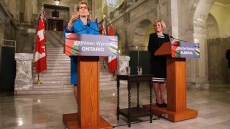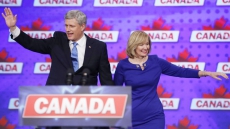SHIMA, Japan — Prime Minister Justin Trudeau will push ahead with efforts to expand Canada's relationship with China, though he might find a cooler reception from the Chinese government following his visit this week to its regional rival, Japan.
Trudeau held bilateral talks this week with Japanese Prime Minister Shinzo Abe in Tokyo, a couple of days before the start of the G7 summit in Shima, Japan.
The meeting with Japan was Trudeau's first in Asia since taking office last fall and reflects the priority the new government has placed on expanding Asian ties.
It remains to be seen whether China has concerns with Trudeau's decision — but Beijing has made no secret about its unhappiness with the G7 meeting in Japan and the group's public worry about rising tensions in the South China Sea.
At the end of Trudeau's meeting with Abe on Tuesday, the Japanese leader told reporters that he and Trudeau "share serious concern" over the ongoing territorial dispute involving China in the South China Sea.
Several governments in the region oppose Chinese claims in that area, while Japan rejects the country's claims in the East China Sea. The competing claims are important because the disputed waters include key shipping lanes.
"On South China Sea, we share serious concern over unilateral actions which heighten tension, including large-scale reclamation, building of outposts and military usage thereof," Abe said through an interpreter, with Trudeau standing at his side.
"We agreed to work closely to secure free and safe seas based on the rule of law."
Abe's remark appeared stronger than what Canada has said on the issue in the past. But following Abe's statement, Trudeau's office insisted Canada's position hadn't budged.
The topic could become delicate for Canada because, like many countries, it has been trying to expand its relationship with China's massive economy through investment and, potentially, free trade.
Trudeau was asked Friday whether he thought the Chinese government might feel shunned by Canada for choosing Japan for its first Asian bilateral visit and for holding the event with Abe. He took pains to emphasize the importance of the China-Canada relationship.

"One of the things that Canadians specifically tasked me to do in electing me prime minister was to re-engage constructively and productively with the world, to create opportunities for the jobs and growth," Trudeau said after the G7 summit.
"I look forward to strengthening and deepening my relationship with all of Asia, including China."
Trudeau also said Canada's ties with China go back 45 years, but that over the last decade relations between the countries were unpredictable due to the former Conservative government's approach.
"I've made it very clear that I'm looking for a positive, constructive relationship with China where we benefit economically from further ties and speak directly to each other on issues of concern, whether they be human-rights issues or consular cases or security concerns," said Trudeau, who will visit China in September for the G20 summit.
China has been sensitive to criticism over its South and East China seas claims, a dispute G7 leaders called a "concern" Friday in their closing declaration of the summit.
David Welch, CIGI chair of global security at the Balsillie School of International Affairs, said Friday that for the first time a G7 communique has fully pushed for international law to be respected in the dispute.
Welch noted that the statement says states' territorial claims must be based on international law, must refrain from force or coercion in support of the claims and that disputes must be settled peacefully.
"I think the Canadian position is evolving and I think the prime minister's general approach to this issue is to try to play ball with the other G7 countries," Welch said in an interview in Ise, Japan.
"We're strong proponents of international law. Now, the challenge is to do this in a way that does not further provoke China and result in a further deterioration of relations with China."




